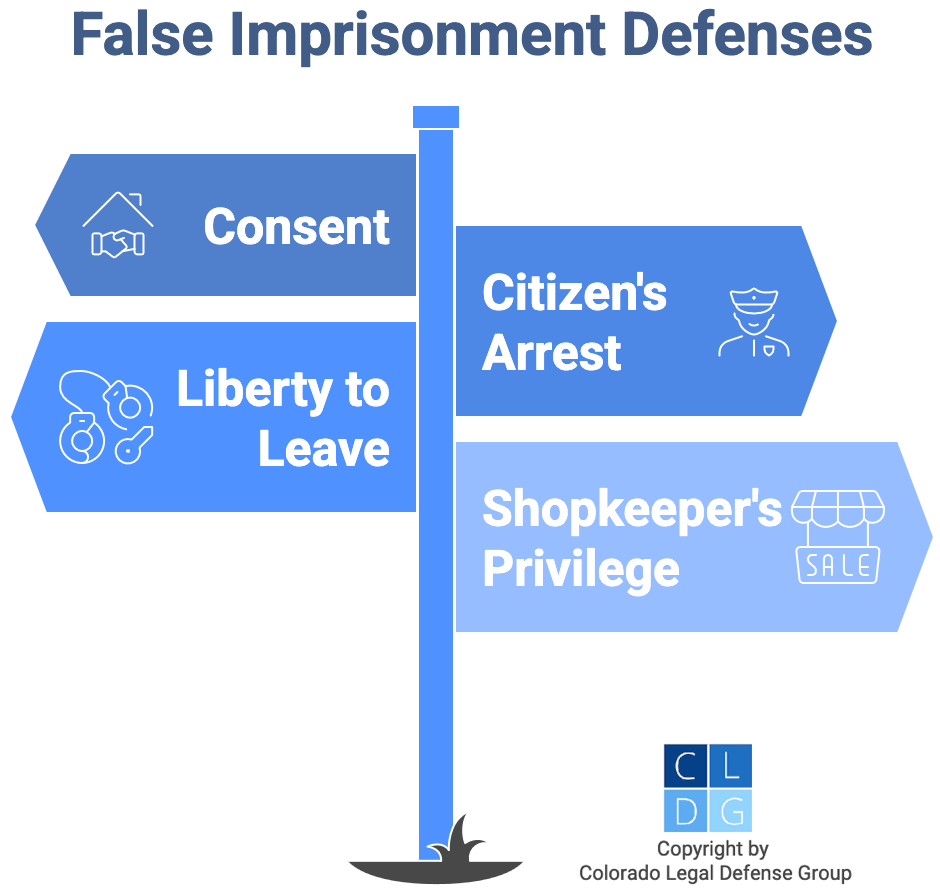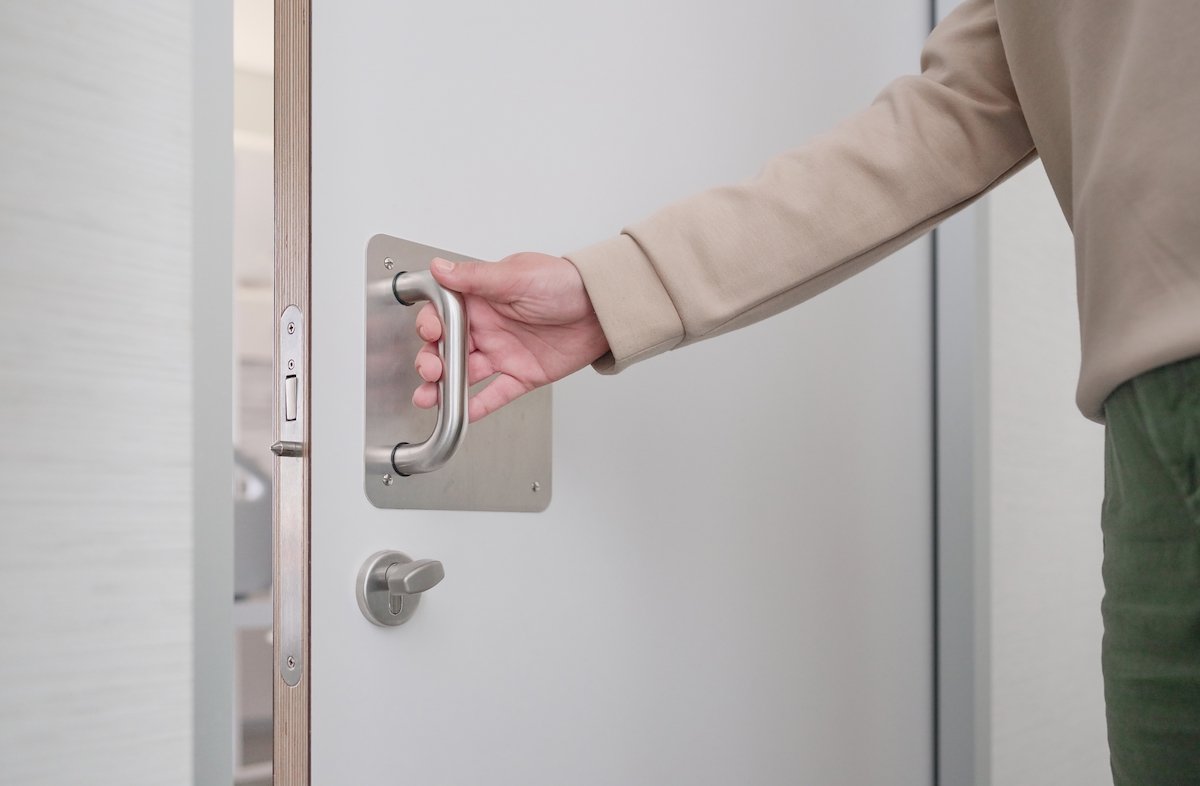Colorado Revised Statute § 18-3-303 prohibits false imprisonment, which is unlawfully detaining or confining someone against their will. Unlike kidnapping, false imprisonment does not require that the victim be moved.
False imprisonment is typically a class 2 misdemeanor in Colorado, punishable by up to 120 days in jail and/or up to $750. However, more serious cases are prosecuted as class 5 felonies, carrying one to three years in prison and $1,000 to $100,000.

In this article, our Denver criminal defense lawyers will address the following key issues regarding Colorado kidnapping laws:
- 1. Elements of CRS 18-3-303
- 2. Penalties
- 3. Defenses
- 4. Plea Bargains
- 5. Related Crimes
- Frequently Asked Questions
- Additional Reading
1. Elements of CRS 18-3-303
For you to be convicted of false imprisonment in Colorado, prosecutors have to prove the following two elements beyond a reasonable doubt:
- You knowingly confined or detained another human being; and
- You did so without that person’s consent and lawful authority.
An example of false imprisonment is a husband blocking the bedroom door with his body to keep his wife from leaving during a fight. Even if she manages to squeeze by and escape, the husband would still be criminally liable for false imprisonment by intentionally and unlawfully confining his wife against her will.
An obvious exception to this law is that police may detain and confine criminal suspects for a reasonable period of time.1

False imprisonment charges often arise out of acts of domestic violence.
2. Penalties
In Colorado, false imprisonment is usually a class 2 misdemeanor, carrying up to 120 days in jail and/or a fine of up to $750. Though there are three circumstances in which false imprisonment is a class 5 felony:
- You used force – or threats of force – to confine or detain the victim, and the detention lasted for at least 12 hours; or
- The victim was under 18 and in a locked or barricaded room under circumstances that caused bodily injury or serious emotional distress. Also, the false imprisonment was part of a pattern of cruel punishment; or
- The victim was under 18 and confined by physical restraints under circumstances that caused bodily injury or serious emotional distress.
As a class 5 felony, false imprisonment carries:
- 1 to 3 years in prison and/or
- A fine of $1,000 to $100,000.2
Note that if the false imprisonment was an act of domestic violence, the court will issue a restraining order mandating you to stay away from the alleged victim.3 Violating a restraining order is its own separate crime.4

Violating CRS 18-3-303 can be a misdemeanor or felony depending on the circumstances.
3. Defenses
Here at Colorado Legal Defense Group, we have represented literally thousands of people accused of violent crimes such as false imprisonment. In our experience, the following four defenses have proven very effective with prosecutors, judges, and juries at getting CRS 18-3-303 charges reduced or dismissed.
- The alleged victim consented to the confinement. As long as the alleged victim was not being confined or detained against their will, no crime occurred.
- The alleged victim was free to go. False imprisonment charges cannot stand if the alleged victim was at liberty to leave.
- You made a lawful citizen’s arrest. You may lawfully detain someone with reasonable force if they committed a crime in your presence.5
- You exercised the “shopkeeper’s privilege.” If you work at a store, you may detain and question a suspected shoplifter in a reasonable manner. Even if you were mistaken, you cannot be prosecuted as long as you acted on good faith and upon probable cause.6
Common evidence in these cases includes video surveillance footage, eyewitness accounts, and recorded communications (such as text messages).

Freedom to leave is a defense to false imprisonment charges.
4. Plea Bargains
False imprisonment is a “lesser included offense” of the more serious Colorado crime of kidnapping, which carries up to 24 years in prison. Depending on the case, prosecutors may agree to reduce kidnapping charges down to false imprisonment as part of a plea agreement.7
In addition to carrying lesser penalties than kidnapping, false imprisonment convictions can eventually be sealed from your criminal record. If you are convicted of kidnapping, it remains on your record forever.8

Merchants can reasonably detain suspected thieves without fear of false imprisonment charges.
5. Related Crimes
- Assault – causing physical harm to another person, such as kicking, pushing, or throwing objects at them.
- Harassment – intentionally bothering, annoying, or alarming someone through repeated contact, obscene gestures, hitting, taunting, or following in public.
- Menacing – putting someone in fear of imminent bodily harm, either through words or actions.
- Stalking – harassing someone in a way that involves both a credible threat and repeated behavior that reasonably causes the victim to be fearful or to suffer serious emotional distress.

False imprisonment in Colorado is detaining someone without consent or lawful authority.
Frequently Asked Questions
What is the difference between false imprisonment and kidnapping in Colorado?
False imprisonment does not require moving the victim to another location, while kidnapping does. False imprisonment is simply confining or detaining someone against their will without consent or lawful authority.
Kidnapping carries much harsher penalties (up to 24 years in prison) compared to false imprisonment, which is typically a misdemeanor with up to 120 days in jail.
When does false imprisonment become a felony instead of a misdemeanor?
False imprisonment becomes a class 5 felony in three situations: (1) you used force or threats and detained someone for 12+ hours, (2) you confined a child under 18 in a locked room causing injury or distress as part of cruel punishment, or (3) you physically restrained a child under 18 (like tying or chaining) causing injury or distress.
These felony charges carry one to three years in prison and fines up to $100,000.
Can I be charged with false imprisonment if the person could have left?
No, if the alleged victim was free to leave at any time, you cannot be convicted of false imprisonment.
The prosecution must prove you actually confined or detained someone against their will. This is one of the most common and effective defenses to false imprisonment charges.
What happens if I am convicted of false imprisonment in a domestic violence case?
If your false imprisonment charge involves domestic violence, the court will automatically issue a restraining order requiring you to stay away from the alleged victim.
Violating this restraining order is a separate crime with additional penalties. You will face the standard false imprisonment penalties plus the restrictions of the protective order.
Additional Reading
For more in-depth information, refer to these scholarly articles:
- Motive as an Essential Element of the Crime of False Imprisonment – Dickinson Law Review.
- False Imprisonment – Nature and Elements – Justification – Boston University Law Review.
- An Analysis of False Imprisonment and Right to Liberty: Judicial Interpretation – Legal Lock Journal.
- False Imprisonment – Void Process – Liability of Judges – Central Law Journal.
- Criminal Law – Suspicious Person Charge – False Imprisonment – Justification – Boston University Law Review.
Legal References
- CRS 18-3-303 – False Imprisonment.
(1) Any person who knowingly confines or detains another without the other’s consent and without proper legal authority commits false imprisonment. This section does not apply to a peace officer acting in good faith within the scope of his or her duties.
(2) False imprisonment is a class 2 misdemeanor; except that false imprisonment is a class 5 felony if:
(a) (I) The person uses force or threat of force to confine or detain the other person; and
(II) The person confines or detains the other person for twelve hours or longer; or
(b) (I) The person confines or detains another person less than eighteen years of age in a locked or barricaded room under circumstances that cause bodily injury or serious emotional distress; and
(II) Such confinement or detention was part of a continued pattern of cruel punishment or unreasonable isolation or confinement of the child; or
(c) The person confines or detains another person less than eighteen years of age by means of tying, caging, chaining, or otherwise using similar physical restraints to restrict that person’s freedom of movement under circumstances that cause bodily injury or serious emotional distress.
(3) Notwithstanding section 13-90-107 or any other provision of law, the statutory privilege between a patient and a physician or between an individual and his or her spouse is not available for the purpose of excluding or refusing testimony in any prosecution for a violation of this section where the conditions described in subsection (2)(b) or (2)(c) of this section are alleged.
(4) Nothing in this section limits the ability of a person to assert the affirmative defense described in section 18-1-703.
See, for example, People v. Martinez (Colo. 1981) 634 P.2d 26. People v. Smith (Colo. 1981) 638 P.2d 1. People v. Gallegos (Colo. 1982) 644 P.2d 920. People v. Denny (Colo. 2025) No. 23CA0638 (unpublished). People v. Romero (Colo.App. 2024) No. 20CA0143 (unpublished). - Same. CRS 18-3-302. Prior to March 1, 2022, class 2 misdemeanor penalties were 3 months to 1 year in jail and/or $250 to $1,000. SB21-271.
- CRS 18-6-801.
- CRS 18-6-803.5.
- CRS 16-3-201.
- CRS 18-4-407.
- People v. Joyce (Colo. App. 2002) 68 P.3d 521. Beyer v. Young (Colo.App. 1973) 513 P.2d 1086. People v. Arispe (Colo. 1976) 555 P.2d 525.
- CRS 24-72-701–711.
